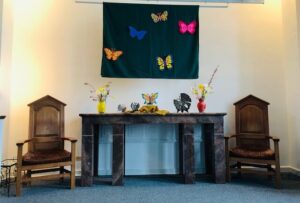Read the Order of Service.
With all due respect to Mr. Thoreau, belonging is a good thing. It’s a necessary thing, actually. Carol Gilligan, the feminist psychologist who first earned notice from her challenge to the developmental theories of Lawrence Kohlberg, argued that the development of identity does not, as prevailing theories even still have it, come from the process of individuation, of separating ourselves from others. Rather, Dr. Gilligan and others asserted, we build our identity through our relationships.
My friend Takeo Fujikura has told me that this is an understanding that’s built into the Japanese language. Takeo said that in Japanese there is no first person singular pronoun, no way to say I. More accurately, there’s no one way to say I, there are eight. That’s because we don’t have just one identity — I am in some very real ways different when I’m with my friends than when I’m with my parents, or when I’m with my child. Who I am depends on who I’m with, if you will, or with whom I’m in relationship. There is a blessing in belonging — an affirmational gift. Belonging helps to make us who we are.
but still I am one.
I cannot do everything,
but still I can do something;
and because I cannot do everything,
I will not refuse to do something that I can do.”
(And sometimes that last line is remembered as “I must not refuse to do something that I can.”)












